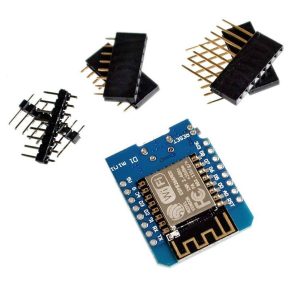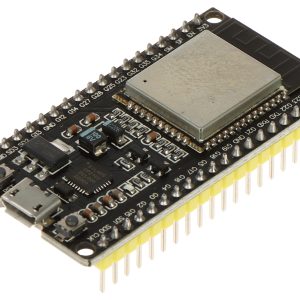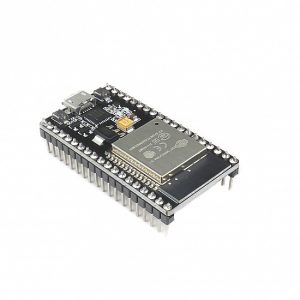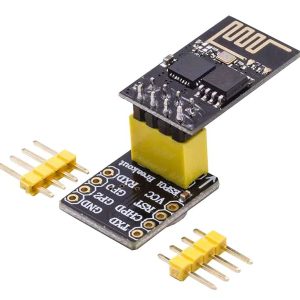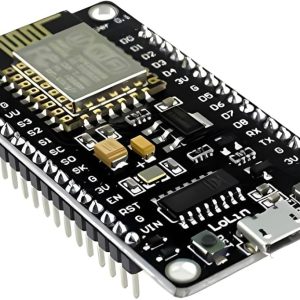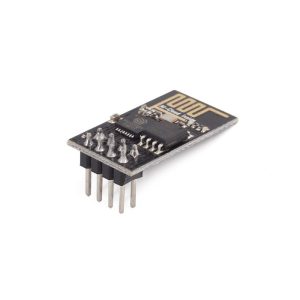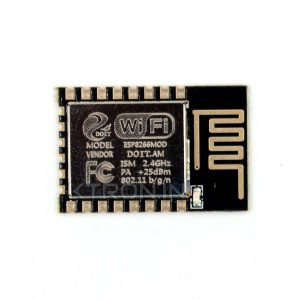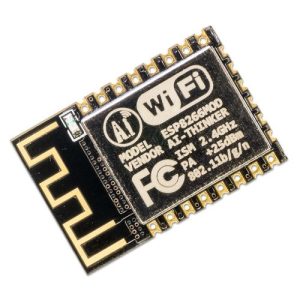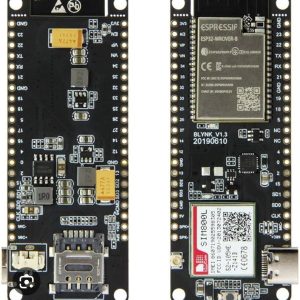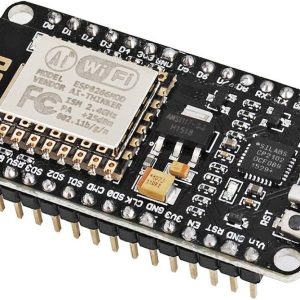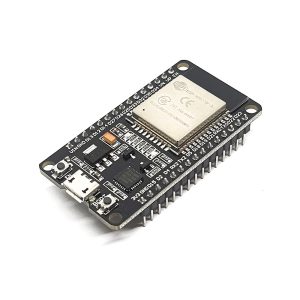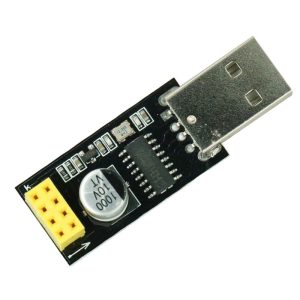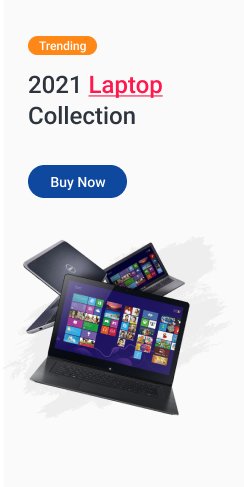-
D1-Mini WIFI Development Board
Original price was: ₨ 750.₨ 600Current price is: ₨ 600.
The D1 Mini WiFi Development Board is a compact, ESP8266-based microcontroller perfect for IoT, automation, and smart projects. It features built-in WiFi 802.11 b/g/n, operates at 3.3V, and is powered via Micro-USB (5V input). With 11 digital I/O pins, analog input, and full support for Arduino IDE, it’s ideal for wireless control systems, home automation, and sensor-based projects.
Small in size but big in performance, it supports OTA (Over-the-Air) programming, and is fully compatible with NodeMCU, MicroPython, and other open-source platforms.
-
ESP Wroom 32 Development Board Module 38 Pin
Original price was: ₨ 1,500.₨ 1,170Current price is: ₨ 1,170.
ESP Wroom 32 38 Pin Development Board is a powerful and compact module featuring dual-core Tensilica LX6 MCU, integrated 2.4GHz WiFi and Bluetooth (BLE). With a wide input voltage range (5–12V) and 38 GPIO pins, it supports PWM, ADC, I2C, UART, and SPI, making it ideal for IoT projects, wireless communication, and Arduino-compatible development.
-
ESP32 38-Pin Development Board WiFi + Bluetooth
Original price was: ₨ 1,200.₨ 1,050Current price is: ₨ 1,050.
The ESP32 38-Pin Development Board features a dual-core 240MHz processor, integrated WiFi & Bluetooth (BLE 4.2), and 38 GPIO pins supporting PWM, ADC, SPI, I2C, UART, and more. Ideal for IoT development, home automation, wireless communication, and Arduino-compatible embedded systems.
-
ESP8266 1S Breakout Adapter in Pakistan
Original price was: ₨ 200.₨ 140Current price is: ₨ 140.
The ESP8266 1S Breakout Adapter is designed to simplify the development and testing of ESP-01/ESP-01S WiFi modules. It features an 8-pin header, 2.54mm standard pitch, and clearly labeled pins (TX, RX, GND, VCC, etc.), making it easy to integrate with Arduino, ESP8266, and NodeMCU platforms. Ideal for IoT projects, DIY smart devices, and embedded systems development. Provides reliable connections and eliminates complex wiring.
-
ESP8266 Ch340 Lolin Node Mcu V3 Wifi Development Board
Original price was: ₨ 800.₨ 600Current price is: ₨ 600.
The Lolin NodeMCU V3 ESP8266 WiFi Development Board is a powerful and beginner-friendly microcontroller for IoT and smart home automation projects. It features the CH340 USB to serial chip, ESP8266EX SoC, and supports Arduino IDE, MicroPython, and Lua. Operates at 3.3V logic, with a 5V USB power supply, and supports WiFi 802.11 b/g/n, making it ideal for wireless applications. Perfect for makers, hobbyists, and students exploring IoT, automation, and embedded systems.
-
ESP8266 WiFi ESP-01 Serial Module
Original price was: ₨ 400.₨ 340Current price is: ₨ 340.
The ESP8266 WiFi ESP-01 Module is a compact, affordable, and highly efficient wireless communication module, ideal for IoT, home automation, and Arduino applications. It operates at 3.3V, uses the ESP8266EX SoC, and offers 802.11 b/g/n WiFi connectivity. With 2 GPIOs, UART interface, and low-power operation, the ESP-01 is perfect for integrating WiFi into smart devices, sensors, and embedded systems. Compatible with NodeMCU, ESPHome, and MicroPython platforms.
-
ESP8266-12E WiFi Module
Original price was: ₨ 400.₨ 300Current price is: ₨ 300.
The ESP8266-12E WiFi Module is a powerful and compact wireless transceiver, ideal for IoT and automation projects. Powered by the ESP8266EX SoC, it features 2MB external flash memory, enhanced PCB antenna, and full support for 802.11 b/g/n WiFi protocols. With 16 GPIOs, UART/SPI/I2C interfaces, and low power consumption, this module integrates smoothly into Arduino, ESPHome, and NodeMCU projects. A robust choice for smart systems, wireless controllers, and cloud-based automation.
-
ESP8266EX ESP8266-12F WiFi Module.
Original price was: ₨ 400.₨ 300Current price is: ₨ 300.
- Its model is ESP-12F.
- Its package is SMD22.
- Its size is 24 x 16 x 3 (+- 0.2)mm.
- Its certification is from FCC, CE,C,REACH,RoHS.
- It has default 32Mb SPI flash.
- It has a UART/ADC/GPIO/PWM interface.
- It has 9 input-output ports.
- It supports 300-4608000 bps and default 115200 bps UART baud rate.
- Its frequency range is 2412- 2484 MHz.
- It has a PCB antenna.
- Its power value is 500mA.
- Its modem sleep value is -20mA.
- Its light sleep value is -2mA.
- Its deep sleep value is -0.02mA.
- Its security is WEP/WPA-PSK/WPA2-PSK
- Its power supply voltages are 3 to 3.6V.
- Its current value is >500mA.
- Its operating temperature is -20 to 85-degree centigrade.
- Its storage environment is -40 to 85-degree centigrade.
- Its default baud rate is 115200.
- It has a TTL serial port level.
-
GSM Module TTGO T-Call V1.4 ESP32 SIM800L
Original price was: ₨ 7,000.₨ 6,500Current price is: ₨ 6,500.
TTGO T-Call V1.4 ESP32 SIM800L GSM Module
Transform your projects with the TTGO T-Call V1.4, a powerful ESP32-based GSM module that combines robust connectivity and versatile functionality. Ideal for IoT applications, this module integrates a SIM800L GSM/GPRS module with the ESP32 microcontroller, enabling seamless communication and data transfer.
-
NodeMCU V2 Lua Wifi Iot Development Board Esp 12E Esp8266
Original price was: ₨ 900.₨ 700Current price is: ₨ 700.
The NodeMCU V2 ESP8266 ESP-12E WiFi Development Board is a compact and efficient microcontroller platform ideal for IoT, home automation, and STEM-based electronics. Powered by the ESP8266 SoC, it supports 3.3V logic level, comes with USB to serial converter (CP2102), and offers seamless WiFi connectivity, GPIO, PWM, I2C, and UART. Perfect for Arduino, Lua scripting, and web-based applications.
-
NodeMcu Wroom Esp32 Wifi Based Microcontroller Development Board
Original price was: ₨ 1,200.₨ 900Current price is: ₨ 900.
- Current receiving 80mA.
- the voltage supply is 2.2V to 3.6V.
- current transmitting is 80mA.
- The number of pins supported is 30.
- The data rate is 54Mbps.
- The frequency is 2.4GHz.
- Surface mount type.
- operating temperature is -40 to 85 degrees centigrade.
- power output is 16.5dBm.
- Integrated 520Kb SRAM.
- Ultra-low-power management.
- 4 Mb flash.
- On-board PCB antenna.
-
USB to ESP8266 Adapter Module
Original price was: ₨ 300.₨ 240Current price is: ₨ 240.
The USB to ESP8266 Adapter Module is a plug-and-play USB-to-serial interface board, specially designed to simplify the programming of ESP8266 ESP-01 WiFi modules. Featuring an onboard CH340G USB-to-serial converter, 3.3V power regulation, and GPIO access pins, this adapter ensures smooth firmware flashing and communication. Compatible with Arduino, NodeMCU, and other microcontrollers, it’s an essential tool for IoT developers and embedded systems engineers.




